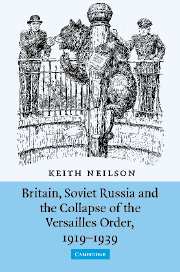Book contents
- Frontmatter
- Contents
- Acknowledgements
- List of abbreviations
- Introduction
- 1 The period of persuasion: British strategic foreign policy and Soviet Russia, 1919–1933
- 2 1933–1934: parallel interests?
- 3 A clash of sensibilities: January to June 1935
- 4 Complications and choices: July 1935–February 1936
- 5 Soviet Russian assertiveness: February 1936–July 1937
- 6 Chamberlain's interlude: May 1937–September 1938
- 7 Chamberlain as Buridan's ass: October 1938–September 1939
- Conclusion
- Appendix I
- Appendix II
- Appendix III
- Bibliography
- Index
1 - The period of persuasion: British strategic foreign policy and Soviet Russia, 1919–1933
Published online by Cambridge University Press: 18 July 2009
- Frontmatter
- Contents
- Acknowledgements
- List of abbreviations
- Introduction
- 1 The period of persuasion: British strategic foreign policy and Soviet Russia, 1919–1933
- 2 1933–1934: parallel interests?
- 3 A clash of sensibilities: January to June 1935
- 4 Complications and choices: July 1935–February 1936
- 5 Soviet Russian assertiveness: February 1936–July 1937
- 6 Chamberlain's interlude: May 1937–September 1938
- 7 Chamberlain as Buridan's ass: October 1938–September 1939
- Conclusion
- Appendix I
- Appendix II
- Appendix III
- Bibliography
- Index
Summary
In August 1920, the Red Army was turned back from the gates of Warsaw. Seven months later, on 18 March 1921, the Treaty of Riga was signed. The Soviet attempt to spread Bolshevism throughout Europe by force of arms had ended. Instead, Lenin and his Bolshevik government decided on a new course. Domestically, the initial effort to establish a communist economy – war communism – was abandoned in favour of the New Economic Policy (NEP). Abroad, Soviet Russia strove to establish diplomatic relations and trade ties with the capitalist Powers. As part of this undertaking, an Anglo-Soviet Trade Agreement was signed on 16 March 1921. Britain's relations with Soviet Russia had begun, although Moscow was not formally recognized by London until 1 February 1924.
From 1919 to 1933, Soviet Russia played a limited, although significant role in British strategic foreign policy. During this relatively peaceful period in international affairs, Britain's focus was on dealing with the problems that arose in the aftermath of the First World War. Domestic tranquillity had to be ensured and the economy needed to be repaired. A new international order, based on the Versailles system, had to be established. In this period, particularly after 1925, British strategic foreign policy was mainly concerned with arms control and disarmament. Driven by the legacies of the First World War, successive governments pursued a pacific policy aimed at reducing both defence expenditure and the likelihood of war.
- Type
- Chapter
- Information
- Publisher: Cambridge University PressPrint publication year: 2005

